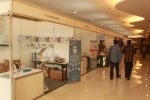Advisory Board Sharing Session: The Role of Phytopharma as National Pharmaceutical Foundation

BANDUNG, itb.ac.id — The 7th Advisory Board Sharing Session was held once more, adopting the theme ‘Indonesian Pharmaceutical Industry Dynamics’ led by Ir. Ferry Soetikno, M.Sc., ITB’s chemical engineering alumni who currently serves as Dexa Group’s CEO. Assisted by the Dean of ITB’s School of Pharmacy, Prof. apt. I Ketut Adnyana, Ph.D., the central discussion will revolve around national self-sufficiency of drug raw materials.
The session began with Ferry explaining about the Covid-19 pandemic at the dawn of 2020, causing a -4.6% contraction in the pharmacy market. To compare, before Covid-19 market growth ranged between 5%-10%. This condition was caused by supply shock. There were restrictions to obtain raw pharmaceutical materials, especially imports from abroad which still consists 90% of Indonesian drug ingredients. However, in 2021, the market experienced a turning point with 18% growth. Moreover, the public mindset has become more preventive in facing the situation as a consequence of the transformative steps socialized by the government.
With the situation in mind, on 12th June 2020 the government has since instructed for the development of local production self-sufficiency, including drug raw materials, ready-to-use medicines, and medical devices. The objective will be achieved through building inter ministry, inter community, and inter aspect synergy. To date, various programs and policies have been released to manage the national urgency for said independence, such as the Domestic Product Employability Intensification (DPEI) and the Domestic Merit Extensive Policy (DMEP) for e-catalogue purposes throughout 2021-2022, Indonesia Proud Production Program (IPP), and Formularium Phytopharma.
“These past two years, the government tirelessly worked hard, they urged every layer of society in this country to contribute to the various programs’ success. It is true that every program requires time to adapt, to convince the diverse set of stakeholders, to then forgo a conclusion and become a more realistic and global program,” stated Ferry.
Moreover, the self-sufficiency urgency also became a highlighted topic of the Ministry of Health Regulation No. 87 concerning Pharmaceutical Raw Material Development Roadmap. The decree contains the Indonesian pharmaceutical industry’s position as a strategic national industry supported by four material pillars: biological, vaccines, natural, and chemical synthesis (chemical API). The four pillars have been experiencing an accelerated shift for these past two years as a consequence of the pandemic. For each pillar, there exist a group of companies from the pharmaceutical material industry who have committed and invested on their own specifications.
Furthermore, in October 2021, the government through the Indonesian Food and Drug Authority also encouraged standardized herbal and phytopharma medicine development in the Modern Authentic Indonesian Drugs (MAID) program during the Covid-19 pandemic. This program was responded upon with the release of Phytopharma Formularium by the Ministry of Health. Ferry added, “Accompaniment was given by the IFDA to encourage the development of phytopharma standardized herbal medicine onwards. All this effort was exerted to bolster the national pharmaceutical raw material autonomy. These supports from the IFDA also served as drivers of the various existing components, so all of us can start to seriously produce the raw materials for Indonesia.”
With Indonesian biodiversity ranked 2nd worldwide, the potential for phytopharma as the backbone of national pharmaceutical raw material autonomy is enormous. The fact becomes an important point into phytopharma development as a natural ingredient-based domestic pharmaceutical product through the formation of a Phytopharma Development Accelerator Task Force. This acceleration program will hopefully become an effective turning point for Indonesia to possess self-sustenance in the pharmaceutical field with its abundant national natural resources in mind.
“The phytopharma development framework becomes clearer by time, with many more parties joining to produce phytopharma. The presented research outcome has also grown closer to the downstream side, thus not restricted at the surface, instead reaching on national production and commercialization,” expressed Ferry at the end of the session.
Reporter: Hanifa Juliana (Urban and Regional Planning, 2022)
Translator: Firzana Aisya (Bioengineering, 2021)

scan for download








